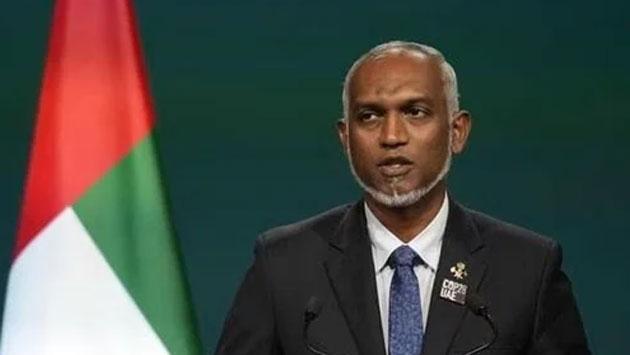26 Aug 2024 - {{hitsCtrl.values.hits}}
 The Maldives is facing a severe economic crisis that endangers its social fabric and political stability. Under President Mohamed Muizzu, the nation's financial troubles have escalated, characterized by soaring debt, shrinking reserves, and an increasing dependency on foreign aid, particularly from China.
The Maldives is facing a severe economic crisis that endangers its social fabric and political stability. Under President Mohamed Muizzu, the nation's financial troubles have escalated, characterized by soaring debt, shrinking reserves, and an increasing dependency on foreign aid, particularly from China.
The scale of the Maldives' debt crisis is staggering. As of March 2024, the total debt amounts to USD 8.3 billion, which is 110.1% of the country's GDP. This debt is composed of USD 7.38 billion in budgetary debt and USD 921 million in guaranteed debt. Notably, the external debt stands at USD 3.4 billion, or 45% of GDP, posing a significant risk to the country's economic stability and sovereignty.
China's influence on the Maldivian economy is increasingly prominent. The Maldives owes China USD 1.11 billion, which represents 14.77% of its GDP and 32.8% of its external debt. This high level of debt to a single country raises serious concerns about economic independence and political leverage. The concentration of debt among a few major creditors leaves the Maldives vulnerable to external pressures and limits its economic maneuverability.
In response to the crisis, President Muizzu's administration is actively seeking financial assistance. The 2024 financing plan is ambitious and risky, targeting USD 306 million in project loans, USD 456 million in budget support or sovereign bonds, and USD 51 million through green or blue bonds.
The Maldives has made several requests for financial aid, including a USD 200 million grant and USD 350 million in soft loans from China, as well as a USD 500 million currency swap. Additionally, Muizzu has appealed to Abu Dhabi for USD 80 million for the Velana International Airport Development Project, and has sought USD 50 million in cash grants from Saudi Arabia, UAE, Bahrain, Oman, Kuwait, and Qatar, along with a USD 200 million deposit with the Maldives Monetary Authority.
China has responded with an additional cash grant of USD 10 million and there are unconfirmed reports of loan repayment deferrals from China and the UAE for five years. However, these measures are insufficient to address the Maldives' vast financial needs.
The Maldives' dwindling reserves exacerbate the crisis. By July, gross international reserves had dropped to USD 395 million from USD 509 million in June, with usable reserves plummeting to just USD 43 million—barely enough to cover one month of essential imports. This reserve crisis is compounded by looming debt servicing requirements, averaging USD 500 million annually for 2024 and 2025, with expectations to peak at USD 1.07 billion in 2026.
The Maldives' debt portfolio is heavily weighted towards China, Saudi Arabia, Abu Dhabi, OPEC, and Kuwait, creating a complex debt management environment and increasing the risk of conflicting interests among creditors. President Muizzu's heavy reliance on China for economic relief has sparked concerns domestically and internationally. Critics argue that this dependency may lead the Maldives into a debt trap, compromising its economic sovereignty and strategic autonomy in the Indian Ocean region.
The Maldivian economy is at a critical juncture. While seeking short-term financial bailouts may offer temporary relief, it does not address the underlying structural issues. The risk of deepening dependence on external powers and the possibility of defaulting on international obligations could lead to a loss of investor confidence, a decline in tourism, and potential social unrest. President Muizzu's administration faces a daunting challenge in averting a full-blown economic catastrophe while managing the nation's significant financial vulnerabilities.
23 Dec 2024 3 hours ago
23 Dec 2024 4 hours ago
23 Dec 2024 5 hours ago
23 Dec 2024 5 hours ago
23 Dec 2024 6 hours ago